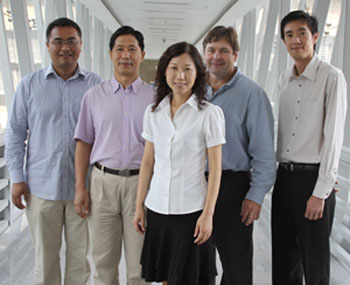| Nov 30, 2011 |
Nanomedicine breakthrough by IBN and IBM named top 10 world changing ideas by Scientific American
|
|
(Nanowerk News) A nanoparticle that can destroy drug-resistant bacteria developed by the Institute of Bioengineering and Nanotechnology (IBN), and the IBM Almaden Research Center, has recently been named one of 10 world changing ideas by Scientific American in its Technology Special Report ('World Changing Ideas – 10 New Technologies That Will Make a Difference', December 2011).
|
|
Published in Nature Chemistry ("Biodegradable nanostructures with selective lysis of microbial membranes"), this nanomedicine breakthrough works against drug-resistant and infectious diseases such as Methicillin-resistant Staphylococcus aureus (MRSA) and vancomycin-resistant Enterococcus. The nanoparticles are physically drawn towards the harmful bacteria in the body like a magnet, and can prevent drug resistance by tearing down the bacterial cell wall and membrane. This mode of attack is fundamentally different from antibiotics and could be a new weapon against superbugs. The nanoparticles can be infused into consumer products such as gels, sprays and lotions or formulated to treat MRSA-induced blood stream and skin infections.
|
 |
| The Research Team (from left to right): Dr Chuan Yang, IBN Research Scientist, Dr Shujun Gao, IBN Research Officer, Dr Yiyan Yang, IBN Group Leader, Dr James L. Hedrick, and Dr Jeremy Tan, IBN Research Scientist.
|
|
Professor Jackie Y. Ying, IBN Executive Director, said, "We are delighted that Scientific American recognizes our nanoparticle discovery as a world changing idea. IBN strives to make a difference with our technologies by offering an alternative treatment solution to common diseases and illnesses. This is an excellent affirmation of our nanotechnology research against drug-resistant bacteria and we will now be focusing on developing these nanoparticles for clinical and consumer applications."
|
|
About the Institute of Bioengineering and Nanotechnology
|
|
The Institute of Bioengineering and Nanotechnology (IBN) was established in 2003 and is spearheaded by its Executive Director, Professor Jackie Yi-Ru Ying.
|
|
Professor Ying was a Professor of Chemical Engineering at the Massachusetts Institute of Technology (1992 - 2005).
|
|
She was recognized as one of "One Hundred Engineers of the Modern Era" by the American Institute of Chemical Engineers in 2008 for her groundbreaking work on nanostructured systems, nanoporous materials and host matrices for quantum dots and wires.
|
|
Under her direction, IBN conducts research at the cutting-edge of bioengineering and nanotechnology. Its programs are geared towards linking multiple disciplines across engineering, science and medicine to produce research breakthroughs that will improve healthcare and our quality of life.
|
|
Drug and Gene Delivery, where the controlled release of therapeutics involve the use of functionalized polymers, hydrogels and biologics for targeting diseased cells and organs, and for responding to specific biological stimuli.
Cell and Tissue Engineering, where biomimicking materials, stem cell technology, microfluidic systems and bioimaging tools are combined to develop novel approaches to regenerative medicine and artificial organs.
Biodevices and Diagnostics, which involve nanotechnology and microfabricated platforms for high-throughput biomarker and drug screening, automated biologics synthesis, and rapid disease diagnosis.
Pharmaceuticals Synthesis and Green Chemistry, which encompasses the efficient catalytic synthesis of chiral pharmaceuticals, and new nanocomposite materials for sustainable technology and alternative energy generation.
|
|
IBN's innovative research is aimed at creating new knowledge and intellectual properties in the emerging fields of bioengineering and nanotechnology to attract top-notch researchers and business partners to Singapore. Since 2003, IBN researchers have published over 710 papers in leading journals.
|
|
IBN also plays an active role in technology transfer and spinning off companies, linking the research institute and industrial partners to other global institutions. The Institute has a portfolio of over 744 patents/patent applications on its inventions, and welcomes industrial and clinical partners to collaborate on and co-develop its technologies. IBN has successfully commercialized 33 patents/patent applications.
|
|
IBN's current staff and students strength stands at over 160 scientists, engineers and medical doctors. With its multinational and multidisciplinary research staff, the institute is geared towards generating new biomaterials, devices, systems and processes to boost Singapore's economy in the medical technology, pharmaceuticals, chemicals, consumer products and clean technology sectors.
|
|
IBN is also committed to nurturing young talents. Besides the training of PhD students, IBN has a Youth Research Program (YRP) for students and teachers from secondary schools, junior colleges, polytechnics, and universities. Since its inception in October 2003, IBN's YRP has reached out to more than 49,000 students and teachers from 274 local and overseas schools and institutions. Over 1,400 students and teachers have completed research attachments at IBN for a minimum period of four weeks. For more information, please log on to: www.ibn.a-star.edu.sg
|

